Kellyanne Conway: Donald Trump not interested in further Hillary Clinton email probe

President-elect Donald Trump “doesn’t wish to pursue” further investigations into Hillary Clinton‘s email practices, a top adviser said Tuesday, a turnaround from all the campaign rallies when Trump roused supporters to chants of “lock her up.” “I think Hillary Clinton still has to face the fact that a majority of Americans don’t find her to be honest or trustworthy, but if Donald Trump can help her heal then perhaps that’s a good thing,” Kellyanne Conway said on MSNBC’s “Morning Joe.” That comes after months of Trump nicknaming his Democratic rival “Crooked Hillary,” questioning whether the Clinton Foundation is a pay-for-play scheme and raging against the Justice Department for refusing to prosecute her for blending private and official business on her homebrew email server. He told her face-to-face at a presidential debate that if he won the presidency, she’d “be in jail.” Conway’s comments were striking because Justice Department investigations are historically conducted without the influence or input of the White House. Presidents do not dictate decisions on which criminal investigations are pursued or their outcome. The disparity between Trump’s taunts on the campaign trail and his approach now, Conway suggested, is part of a purposeful shift away from at least the tone, if not the substance, of his past rhetoric. “I think he’s thinking of many different things as he prepares to become the president of the United States and things that sound like the campaign aren’t among them,” she said. Trump himself has appeared to waver on whether he would want to seek further probes into possible wrongdoing by the Clintons. “I’m going to think about it,” he said in a “60 Minutes” interview, his first sit-down interview after the Nov. 8 election. “I feel that I want to focus on jobs, I want to focus on health care, I want to focus on the border and immigration and doing a really great immigration bill. We want to have a great immigration bill. And I want to focus on – all of these other things that we’ve been talking about.” Trump said in that interview that Clinton “did some bad things,” but ultimately the Clintons are “good people” and “I don’t want to hurt them.” Conway’s comments came as Trump abruptly canceled a meeting with The New York Times on Tuesday, accusing the organization of changing the conditions for the session “at the last moment.” The newspaper denied this and said Trump’s aides tried to change the rules. But Hope Hicks, speaking for Trump, said later the meeting was back on and he’d be “going to The New York Times” later Tuesday. Trump met privately Monday with representatives of the television networks. The president-elect heralded “more great meetings” in his Manhattan tower as he continues shaping his administration before heading to Florida for Thanksgiving on Tuesday. Republished with permission of the Associated Press.
WikiLeaks founder denies Russia behind Clinton campaign email hacking
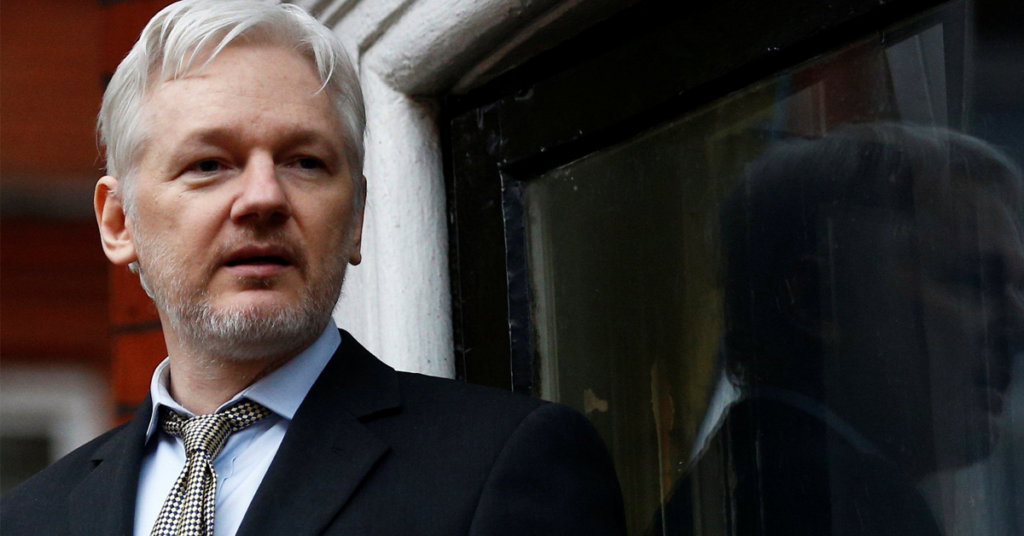
WikiLeaks founder Julian Assange denied Thursday that the Russian government or any other “state parties” were his group’s source for more than 50,000 hacked emails from the files of Hillary Clinton‘s campaign chairman, John Podesta. In separate statements from WikiLeaks and in an interview with a television network supported by the Russian government, Assange dismissed warnings that Russia was the main actor behind cyberintrusions on Podesta and other politically connected individuals and organizations. The WikiLeaks founder offered no evidence to support his denials in the face of U.S. government statements that American intelligence agencies have concluded that Russia was behind the hacking campaigns of Democratic entities in the U.S. Those breaches have raised alarms of potential intrusions on election day. WikiLeaks’ “sources for the Podesta emails currently being published are not state parties,” Assange said in a statement. He also told the RT network that warnings from Clinton and her campaign that Russia was behind the hacking of Podesta’s Gmail account were “false.” “Hillary Clinton has stated multiple times, falsely, that 17 U.S. intelligence agencies had assessed that Russia was the source of our publications,” Assange told the RT network, also known as Russia Today. “That’s false – we can say that the Russian government is not the source.” Russian officials have also denied any role. “Only Russia’s senior-most officials could have authorized these activities,” Director of National Intelligence James Clapper said in October. Clapper did not specifically name Russian President Vladimir Putin or other Russian officials, but U.S. cybersecurity experts concluded that hacking groups affiliated with Russian government and military intelligence services had roles in the breach of the Democratic National Committee. WikiLeaks began releasing nearly 20,000 emails last July hacked from the DNC’s computer system. Some of the emails disparaged Clinton’s rival, Sen. Bernie Sanders, eventually prompting the resignation of then-DNC chair Debbie Wasserman Schultz. U.S. officials and private computer crime specialists blamed that leak on Russian-linked hackers. Assange was granted asylum by Ecuador and lives in its embassy in London. He fled there in 2012 after Sweden pressed a warrant for his arrest on a sexual assault allegation. Media organizations have reported on each new daily WikiLeaks release of Podesta’s emails in recent weeks. Clinton campaign officials have declined to discuss the emails, questioning whether some of the material might be doctored. Thursday’s release of hacked Podesta emails include: In a March 2015 hacked email, Hillary Clinton told her top foreign policy adviser last year that Prime Minister Benjamin Netanyahu of Israel had created “an opening that should be exploited” after Netanyahu was forced to apologize for making remarks about Israeli Arabs that were condemned as racist. Clinton made the comment to adviser Jake Sullivan, who emailed a link to a New York Times story detailing the controversy in Israel over Netanyahu’s remarks and a fight between him and the Obama administration over remarks promising that no Palestinian state would ever be established on his watch. In a hacked email from September 2015, Clinton communications director Jennifer Palmieri told Podesta that Clinton would have to make herself more available to reporters if Vice President Joe Biden entered the presidential race. “But if Biden gets in – we are going to have to make time for her to do more press,” Palmieri wrote. “He will do a ton of it. It is free and he doesn’t have to travel anywhere to do. So I am thinking about a post-Biden press outreach plan, too.” In a hacked email chain from last February, Clinton’s campaign staff discussed whether to respond on the day the nation learned Supreme Court Justice Antonin Scalia had died. “I am having a hard time imagining what she would say,” Palmieri said. “In a day or two it could be appropriate to talk about SCOTUS stakes, but seems off for tonight.” Republished with permission of the Associated Press.
James Comey: The do-the-right-thing guy in email maelstrom
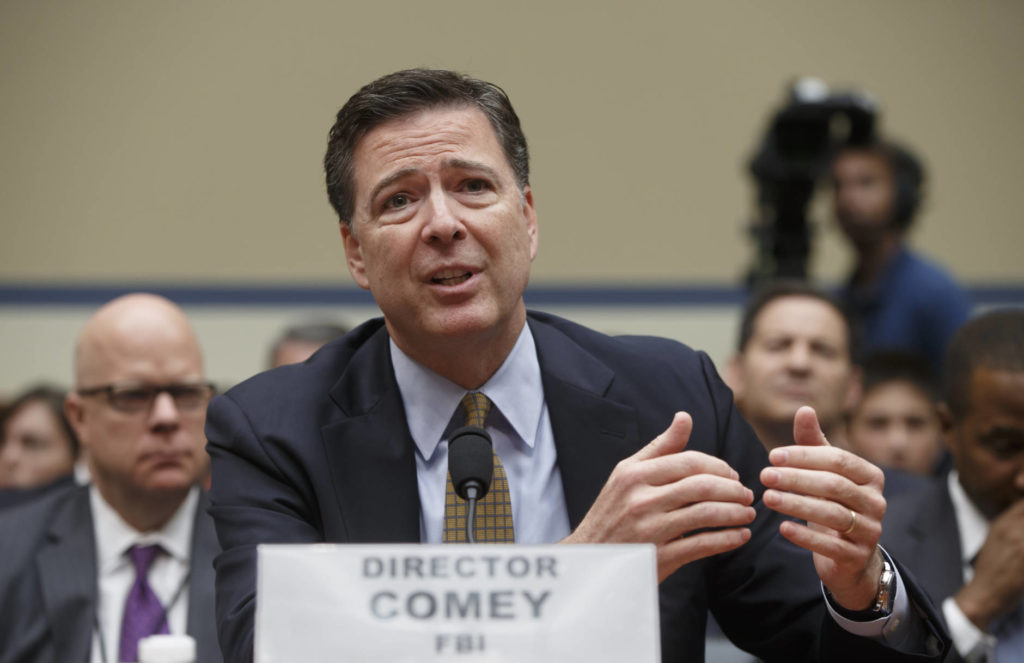
FBI Director James Comey once called it a crucial leadership test: Anticipating whether a decision makes sense “through the eyes of others.” Now his own big decision has Democrats and even some Republicans wondering whether he failed his own test. The FBI director who prides himself on moral rectitude and a squeaky-clean reputation is being criticized from all sides for lobbing a stink bomb into the center of the presidential race. His disclosure that investigators have found more emails that may – or may not – relate to Democrat Hillary Clinton’s use of a private email setup as secretary of state has jolted the race and generated far more questions than answers. This isn’t the first time Comey has found himself in the spotlight for taking a stand on what the 6-foot-8 lawyer saw as the moral high ground. Perhaps the last previous thing many Americans heard about Comey was the tale of his dramatic rush to the bedside of then-Attorney General John Ashcroft in a darkened hospital room in 2004 for a standoff with senior White House officials over federal wiretapping rules. Comey, serving as acting attorney general during Ashcroft’s illness, dashed to the bedside to block Bush administration officials from making an end run to get Ashcroft’s permission to reauthorize a secret no-warrant wiretapping program. “That night was probably the most difficult night of my professional life,” Comey testified before Congress in 2007. Perhaps until now. Former Justice Department officials and lawmakers from both parties are calling Comey’s revelation about Clinton’s emails just 11 days before the election an improper, astonishing and perplexing intrusion into politics in the critical endgame of the 2016 campaign. It’s an unexpected predicament for the man who has painted ethical decision-making as an easy call. “There’s right, and there’s wrong, and it ain’t hard to tell the difference,” he once said. That internal certitude has led the FBI official to freelance his positions at times. Last year he broke from the White House in suggesting a possible link between police officers’ anxieties about taking actions that could be recorded on viral videos and rising homicide rates in some American cities. The White House distanced itself from those remarks, saying there was no scientific evidence to support a connection, or show that officers were pulling back from their responsibilities. Comey, a former Republican who is no longer registered with a political party, spent 15 years as a federal prosecutor before serving in the George W. Bush administration. His office brought the case that led to Martha Stewart‘s conviction on obstruction of justice and lying to government investigators. As an assistant U.S. attorney in Virginia, he handled the investigation of the 1996 bombing of the Khobar Towers housing complex in Saudi Arabia that killed 19 members of the U.S. military. President Barack Obama, when he nominated Comey for a 10-year-appointment to the FBI job in 2013, cited his willingness to stand up to power “at key moments when it’s mattered most,” referencing the hospital-room standoff. Aides say Obama’s high opinion of Comey still stands. But the White House is leaving the FBI director dangling, saying it is up to him to defend himself in the face of what spokesman Josh Earnest called “significant criticism from a variety of legal experts, including individuals who served in senior Department of Justice positions in administrations that were led by presidents in both parties.” Indeed, Rep. Jim Jordan, R-Ohio, a hard-line conservative and House Judiciary Committee member, told Fox News Radio that “this was probably not the right thing for Comey to do, the protocol here, to come out this close to an election. But this whole case has been mishandled, and now it is what it is.” And former Rep. Joe Walsh, a supporter of Donald Trump, tweeted that Comey’s action amounted to an “unconstitutional abuse of government power against our electoral process. Just not right.” Senate Democratic leader Harry Reid of Nevada went a step further and accused Comey of deliberately inserting himself into the race to damage Clinton’s presidential prospects, suggesting the FBI director may have broken the law. Comey, 56, made his disclosure about the Clinton emails despite admonitions from officials within the Justice Department not to go there. It is longstanding Justice Department protocol to avoid taking investigative action in the run-up to an election that could affect its outcome. Comey told colleagues that he felt obligated to go public with the information after having previously told Congress over the summer that the investigation into Clinton’s emails had been concluded without prosecution. Trying to explain his decision, he wrote to FBI employees that it would have been “misleading to the American people were we not to supplement the record” despite the “significant risk of being misunderstood.” Christine Chung, a New York lawyer who worked with Comey when he was the top federal prosecutor in Manhattan, described him as ever “determined to do the right thing.” The criticism he’s faced over the email disclosure, she added, is a “lesson for why good people shouldn’t go to Washington.” Republished with permission of the Associated Press.
Democrats weigh down-ballot drag of Hillary Clinton email saga
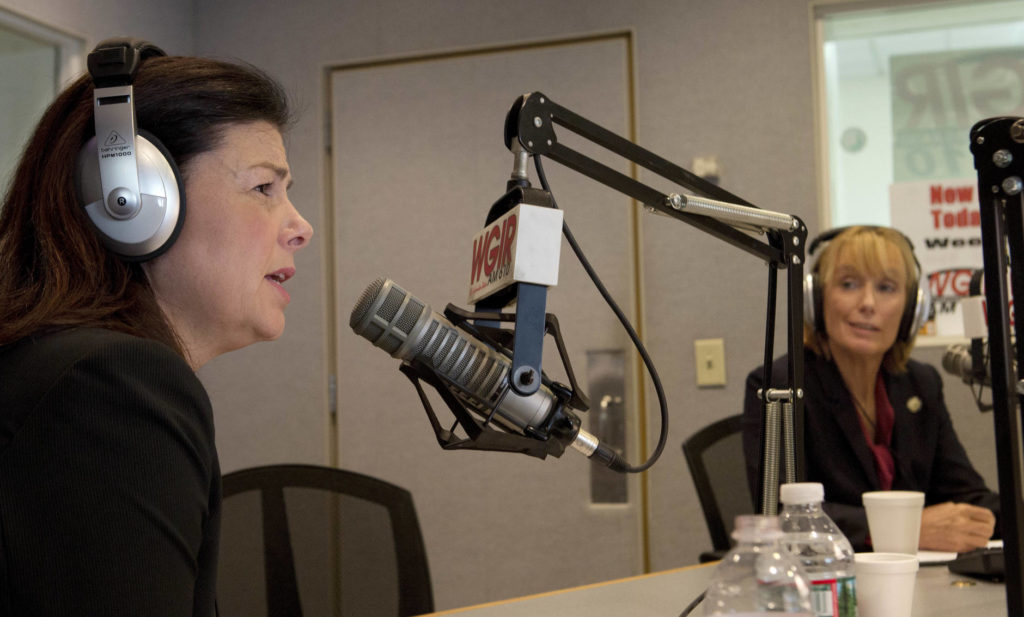
Hillary Clinton is not the only one playing defense after the FBI‘s disclosure last week of additional emails relevant to its probe of her use of a private email server. Other Democrats are under the gun, too, in dozens of down-ballot races that will determine whether they control the House and Senate next year. Clinton herself still is favored and a tracking poll conducted by ABC News and the Washington Post suggested little immediate change following the email story breaking on Friday. Still, it’s unflattering attention for Clinton in a race in which the candidate in the spotlight has typically slumped in the polls. And to the extent the fortunes of down-ballot Democrats rise and fall with Clinton, it’s a worrisome development for the party. At the very least, the flare-up gives Republicans, many of whom have been repeatedly on the defensive over a slew of controversies involving GOP presidential nominee Donald Trump, a welcome opportunity to go on offense. “This is the first time in months that down-ballot Democrats have been forced to play defense on their nominee,” said GOP consultant John Ashbrook. Still, Ashbrook says, “some of these states are almost baked” after months of campaign attacks and counter-attacks. In New Hampshire, the campaign of embattled GOP incumbent Sen. Kelly Ayotte was quick to put out a digital advertisement entitled “Dodges” that spliced television news clips on the renewed email controversy with older snippets of her opponent, Democratic Gov. Maggie Hassan, hemming and hawing when asked if Clinton is honest and trustworthy. Democrats say they haven’t seen slippage yet and they hope that the email story won’t move the needle in a half-dozen or so Senate races that are either tied or within the polling margin of error. “Headed into the final days of the election, Republicans will try whatever they can to distract from their failed records and indefensible support of Donald Trump,” said Lauren Passalacqua, national press secretary for the Democratic Senate Campaign Committee. FBI Director James Comey told Congress Friday that the bureau had discovered additional emails that might be relevant to the Clinton email case. In July, Comey announced that the FBI had completed its probe into the Clinton email server and said that Clinton would not be charged – though he reproached her for being careless with classified information. “Any slight breeze in any direction going into this final week has the potential to swing these races,” said Ian Prior, a spokesman for the Senate Leadership Fund “super PAC” that is spending heavily on behalf of GOP Senate candidates. Republicans are stoking the controversy in news releases, web ads, and in the media, but it’s not likely to become a major issue in a late burst of campaign ads. Instead, candidates are already making their “closing arguments.” “Look, it’s not a good development for Hillary Clinton,” said Democratic strategist Steve Elmendorf. “But I think we’ve seen in the polls so far that it hasn’t had much of an impact.” In the House, the GOP’s campaign committee sent out press releases trying to make the email inquiry resonate. “This is just another reminder to voters of why they haven’t trusted Hillary Clinton from the get-go,” said Katie Martin, a spokeswoman for the National Republican Congressional Committee. Still, Republicans were not airing TV ads targeting the email issue. None of the three TV ads the NRCC began airing Monday mentioned Clinton’s emails. Democrats were unified in fighting back against the GOP attacks – led by Clinton herself, who said Monday “there is no case here” by the FBI. “Democrats are not wavering in their support for Secretary Clinton. This includes voters and candidates sharing the ballot with her,” said Meredith Kelly, a spokeswoman for the Democratic Congressional Campaign Committee, which supports Democratic House candidates. Republished with permission of the Associated Press.
FBI review involves thousands of newly discovered Hillary Clinton emails

The FBI will have to sort through thousands of newly discovered emails in its renewed examination of the practices of Hillary Clinton and her aides, a U.S. official said Monday, raising questions about whether any findings might be released before Election Day. The Justice Department, moving to address concerns over the timing of the revelation of the emails and a potential post-election spillover, said Monday it would “dedicate all necessary resources” to concluding the review promptly. The timing matters because Donald Trump has been assailing Clinton ever more vigorously since FBI Director James Comey revealed the existence of the emails in a remarkable and ambiguous letter to Congress last Friday. He said agents would take steps to review the messages, which were found on a computer seized during an unrelated investigation involving the estranged husband of a Clinton aide. Rep. Anthony Weiner, the disgraced former New York congressman, is being investigated in connection with online communications with a teenage girl. He was separated this year from Huma Abedin, one of Clinton’s closest advisers. At the White House, spokesman Josh Earnest said he would neither defend nor criticize the timing of Comey’s disclosure. But he also said President Barack Obama does not believe Comey was trying to influence the election, or strategizing to benefit one candidate or party. “He’s in a tough spot, and he’s the one who will be in a position to defend his actions in the face of significant criticism from a variety of legal experts, including individuals who served in senior Department of Justice positions in administrations that were led by presidents in both parties,” Earnest said. It was not immediately clear exactly how many emails have been recovered or what significance, if any, they might have. But the U.S. official who spoke to The Associated Press said the trove numbers in the thousands and the FBI, which had a warrant to begin the review, would be focusing on those deemed pertinent to its earlier Clinton email server investigation. In its letter to lawmakers, the department promised to “continue to work closely with the FBI and together dedicate all necessary resources and appropriate steps as expeditiously as possible.” The FBI and Justice Department closed that investigation, which looked into whether Clinton and her aides had mishandled classified information, without charges in July. The official who spoke to the AP was not authorized to discuss an ongoing investigation by name and spoke on condition of anonymity. The fact that another cache of emails potentially important to the investigation has only recently been discovered raises an immediate question: How could Abedin have been unaware of their existence. The answer is not yet clear, but it’s possible that either she did not know about the emails on the computer of her estranged husband, forgot about them or for some other reason did not turn them over. In a sworn deposition taken in June as part of a lawsuit filed by the conservative legal group Judicial Watch, Abedin was asked about what devices she had used to send or receive messages from her account on the clintonemail.com server. As part of the process in 2015 of returning her work-related emails to the State Department, Abedin said she “looked for all the devices that may have any of my State Department” work and provided two laptops and a Blackberry to her lawyers for review. Abedin made no mention of there being additional devices where her emails might have been saved. “I was not involved in the process,” Abedin said. “I provided them with the devices and the materials and asked them to find whatever they thought was relevant and appropriate, whatever was their determination as to what was a federal record, and they did. They turned materials in, and I know they did so. I couldn’t tell you from what device.” Abedin went on to say that she also provided her lawyers with her login and password to access her account on the Clinton server, which she said she used for all work-related matters while serving at the State Department. If the FBI finds emails Abedin sent or received through the clintonemail.com server archived on the device recently recovered from her home, that would appear to conflict with what she told the FBI earlier this year. In an April interview, Abedin told FBI agents she had turned over two laptops and the Blackberry she used while at the State Department to her lawyers in 2015, and that she was not involved in their review of what to provide. However, Abedin added that after she left the State Department in 2013, Clinton’s staff transitioned to a different email sever and she “lost most of her old emails as a result.” Abedin said she had only accessed her clintonemail.com account through a web portal and that she “did not have a method for archiving her old emails prior to the transition.” A person familiar with the investigation said the device that appears to be at the center of the new review belonged only to Weiner and was not a computer he shared with Abedin. As a result, it was not a device Abedin searched for work-related emails at the time of the initial investigation, according to the person, who said of Abedin that it was “news to her” that her emails would be on a computer belonging to her husband. Even if the recovered emails are found to contain classified information, it’s not clear what impact that would have on the investigation. Comey has already described Clinton and her aides as “extremely careless” and has said agents found scores of classified emails on Clinton’s server. But he also said there was no evidence that they intended to mishandle classified email or obstructed justice, elements he suggested would be necessary for a prosecution. Republished with permission of the Associated Press.
Hacked trove shows Hillary Clinton aides suggesting email jokes
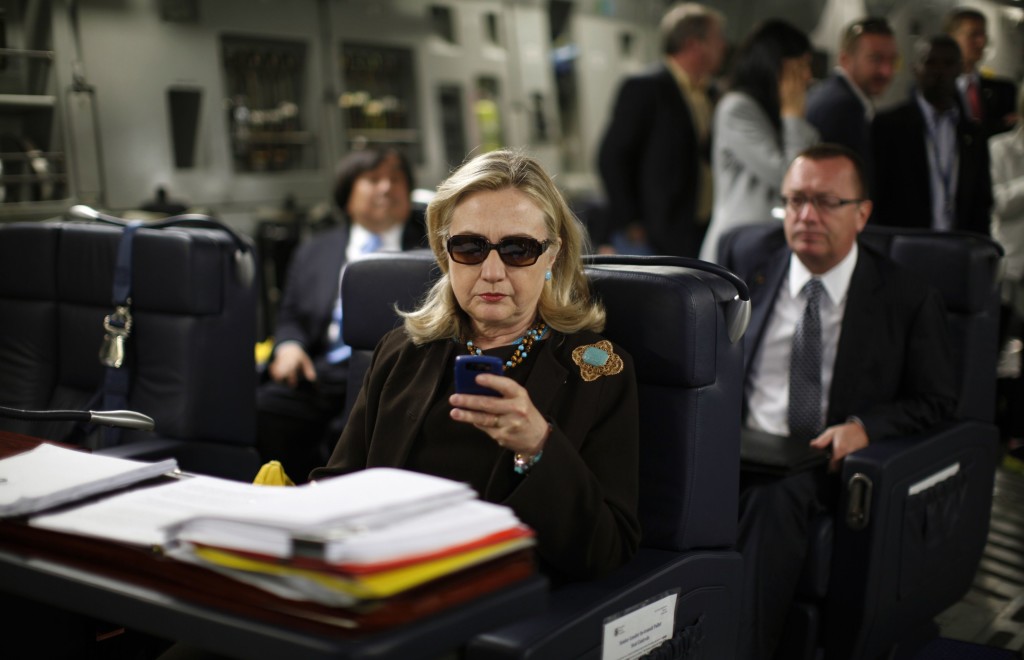
Hacked emails from the personal account of Hillary Clinton‘s top campaign official show her aides considered inserting jokes about her private email server into her speeches at several events – and at least one joke made it into her remarks. “I love it,” she told a dinner in Iowa on August 14, 2015, noting she had opened an online account with Snapchat, which deletes posts automatically. “Those messages disappear all by themselves.” The crack scored a laugh from the audience, but the issue was plenty serious. About a month earlier, news broke of an FBI investigation into whether some of the emails that passed through Clinton’s unsecured server contained classified information. Ultimately, the agency criticized Clinton for being reckless with classified information but declined to prosecute her. But hacked emails of John Podesta, Clinton’s top campaign official, show the Democratic candidate and her team were slow to grasp the seriousness of the controversy, initially believing it might blow over after one weekend. It did not, and became the most recent example of a penchant for secrecy that has fueled questions about Clinton’s trustworthiness, which she has acknowledged has been a political challenge. The joke was included in hacked emails that WikiLeaks began releasing earlier this month, saying they included years of messages from accounts used by Podesta. Podesta warned that messages may have been altered or edited to inflict political damage, but has not pointed to any specifics. Almost from the moment The Associated Press on March 3, 2015, called the campaign for comment on its breaking story that Clinton had been running a private server to five months later, campaign aides sought venues on Clinton’s schedule where she could show some humor over the issue, according to the hacked emails. In a series of emails on March 3, 2015 – the same day The Associated Press called for comment – staffers tossed around the idea of making jokes about the emails at a dinner hosted by EMILY’s List, a political action committee, that evening. “I wanted to float idea of HRC making a joke about the email situation at the EMILY’s List dinner tonight,” Jennifer Palmieri, director of communications for Clinton’s campaign, wrote at 2:37 p.m., using the candidate’s initials. “What do folks think about that?” The idea got a mostly favorable response at first. “I don’t think it’s nuts if we can come up with the right thing. But it could also be nuts,” replied campaign spokesman Nick Merrill a couple of minutes later. “I think it would be good for her to show some humor,” added Kristina Schake, now a deputy communications director. “…More jokes are welcome too.” But political consultant Mandy Grunwald nixed the idea after speaking with Jim Margolis, a media adviser to the campaign. “We don’t know what’s in the emails, so we are nervous about this,” Grunwald wrote to Merrill and Schake at 6:09 p.m. that night. “Might get a big laugh tonight and regret it when content of emails is disclosed.” Clinton’s campaign aides also considered using Virginia Gov. Terry McAuliffe‘s 2015 appearance at the Gridiron Dinner, an annual Washington joke-fest involving journalists and politicians, to try and defuse the email issue. McAuliffe is a longtime confidante and fundraiser for Clinton, and was chairman of her unsuccessful 2008 presidential bid. “Anyway what do we think about using gridiron to puncture the email story a little,” wrote Palmieri, who suggested possible joke topics, including one involving Jeb Bush. Clinton campaign manager Robby Mook expressed concern, saying reinforcing the idea that Clinton and McAuliffe are close “conjures the 90s stuff” – a reference, to Bill Clinton‘s two turbulent terms in office. McAuliffe’s routine at the Gridiron did not ultimately include the discussed email routine. Five months later, Hillary Clinton’s director of speechwriting, Dan Schwerin, shared a draft of a speech for the annual Iowa political event known as the Wing Ding dinner in an email to colleagues, asking for input. “I look forward to your feedback. (Also, if anyone has a funny email/server joke, please send it my way.),” he wrote on August 13. Republished with permission of the Associated Press.
State aide sought to change classification of Hillary Clinton email

A senior State Department official asked the FBI to help last year in reducing the classification of an email from Hillary Clinton‘s private server, according to bureau records released Monday. It was to be part of a bargain that would have allowed the FBI to deploy more agents in foreign countries, according to the records. It was not immediately clear whether the State Department official or someone at the FBI first raised the prospect of a bargain over the email’s classification. The bureau records, citing an FBI official whose name was censored, said Undersecretary for Management Patrick F. Kennedy sought assistance in exchange for a “quid pro quo.” But the FBI’s separate statement Monday said it was the now-retired FBI official who first asked Kennedy about deploying more agents overseas. The FBI ultimately rejected the idea, which would have allowed the State Department to archive a message related to the 2012 attacks on the U.S. diplomatic compound in Benghazi, Libya, in the basement of its Washington headquarters “never to be seen again,” according to the FBI files. The email described reports in November 2012 that Libyan police were arresting suspects in the attack. It had been forwarded to Clinton’s private email address by Jake Sullivan, one of her top aides and the department’s director of policy planning, who was using his government email account. Republicans quickly seized on the report as collusion within the Obama administration to protect Clinton, now the Democratic presidential nominee. “CORRUPTION CONFIRMED: FBI confirms State Dept. offered ‘quid pro quo’ to cover up classified emails,” read a tweet from Team Trump, retweeted by the candidate. Clinton campaign manager Brian Fallon said, “It is well known that there was strong disagreement among various government agencies about the decisions to retroactively classify certain material in emails sent to Secretary Clinton. Agencies that took issue with this overclassification did so based on their own beliefs, and we were not part of these disagreements that played out inside the government.” Kennedy was a close aide to Clinton during her tenure as the nation’s top diplomat between 2009 and early 2013. He had served in his position since November 2007 under President George W. Bush. In the FBI records, a bureau official said Kennedy “asked his assistance in altering the email’s classification in exchange for a ‘quid pro quo,’” and that in exchange “State would reciprocate by allowing the FBI to place more agents in countries where they are presently forbidden.” The FBI said Monday the now-retired FBI official had fielded Kennedy’s request to change the email classification and had said it would be considered if Kennedy “would address a pending, unaddressed FBI request for space for additional FBI employees assigned abroad.” The bureau said the FBI subsequently investigated the proposed arrangement but did not describe the outcome of that review. “Although there was never a quid pro quo, these allegations were nonetheless referred to the appropriate officials for review,” the FBI said in its Monday statement. The State Department said Kennedy had been trying to understand the FBI’s classification decisions. “This allegation is inaccurate and does not align with the facts,” department spokesman Mark Toner said in a statement. He also said there was never an increase in the number of FBI agents assigned to Iraq as a result of the conversations. The disclosure was included in 100 pages the FBI released from its now-closed investigation into whether the former secretary of state and her aides mishandled sensitive government information that flowed through the private mail server located in her New York home. Kennedy proposed using an obscure provision under the U.S. Freedom of Information Act to keep the existence of the secret document from becoming public, the FBI files said. The provision, known as “B9,” is intended to protect geological and geophysical information and data, including maps, concerning wells and is the most rarely used FOIA exemption. In fiscal 2015, the Obama administration cited it only 46 times out of 769,903 information requests. Most of those cases involved the Environmental Protection Agency and the Defense Department. “Kennedy told (redacted) that the FBI’s classification of the email in question caused problems for Kennedy and Kennedy wanted to classify the document as ‘B9,’” The FBI report says. “Kennedy further stated that the ‘B9’ classification would allow him to archive the document in the basement of DoS (Department of State) never to be seen again.” The FBI official said that after learning later that the information in question concerned the Benghazi attacks, he contacted Kennedy and told him there was “no way he could assist” with declassifying the material found in the email. The Associated Press reported the existence of the secret Benghazi-related email in May 2015, though the classified content of the document has never been made public. At the time, administration officials acknowledged interagency disagreements about whether certain information in the emails was classified, disagreements that the State Department said were contributing to the slow processing of their public release under the Freedom of Information Act. House Republicans said Monday that the reports of Kennedy’s behind-the scenes maneuvering with the FBI were “extremely disturbing” and called on him to be removed from his job at the State Department. “Those who receive classified intelligence should not barter in it – that is reckless behavior with our nation’s secrets,” said House Oversight and Government Reform Committee Chairman Jason Chaffetz, R-Utah, and House Intelligence Committee Chairman Devin Nunes, R-Calif., in a joint statement. Republished with permission of the Associated Press.
Benghazi emails involving Hillary Clinton recovered by FBI, State Department says
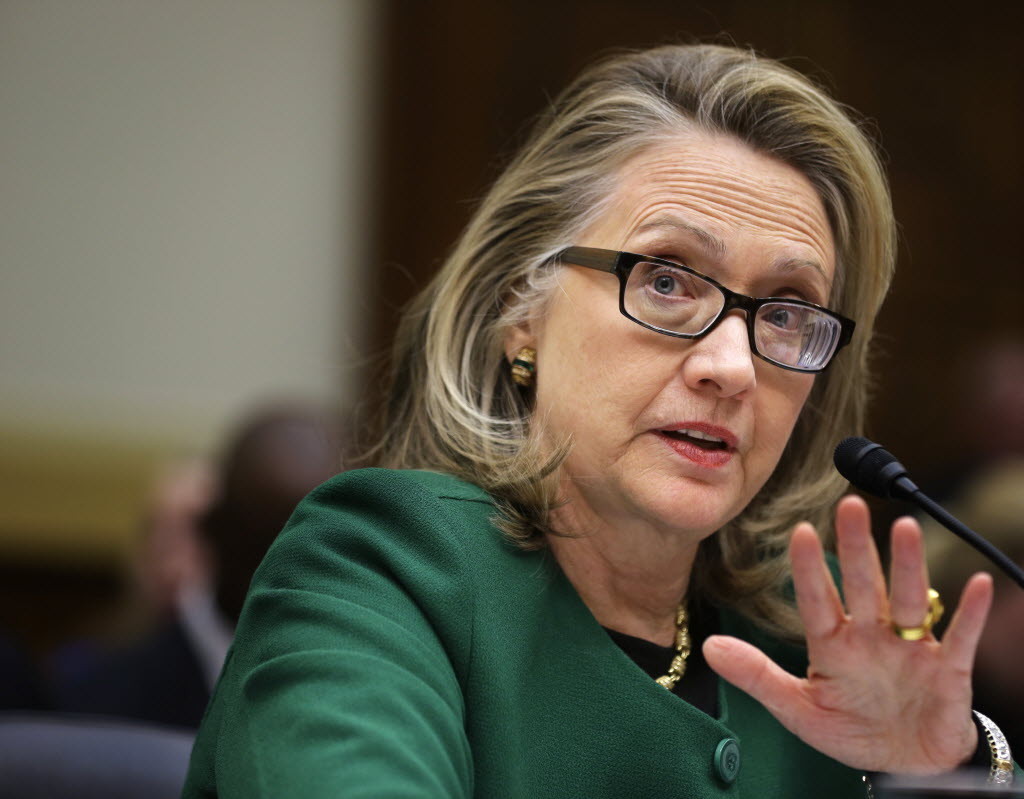
The State Department says about 30 emails involving the 2012 attack on U.S. compounds in Benghazi, Libya, are among the thousands of Hillary Clinton emails recovered during the FBI’s recently closed investigation into her use of a private server. Government lawyers told U.S. District Court Judge Amit P. Mehta Tuesday that an undetermined number of the emails among the 30 were not included in the 55,000 pages previously provided by Clinton to the State Department. The agency said it would need until the end of September to review the emails and redact potentially classified information before they are released. The hearing was held in one of several lawsuits filed by the conservative legal group Judicial Watch, which has sued over access to government records involving the Democratic presidential nominee. The State Department has said the FBI provided it with about 14,900 emails purported not to have been among those previously released. Clinton previously had said she withheld and deleted only personal emails not related to her duties as secretary of state. In a separate development Tuesday, a law enforcement official told The Associated Press that the FBI is expected to release documents soon related to its investigation, which focused on whether Clinton and her aides mishandled government secrets. The official, who was not authorized to discuss the matter by name and spoke on condition of anonymity, said documents in the case would be made public as the FBI responds to Freedom of Information Act requests. It wasn’t immediately clear when the documents would be released or exactly what they would include. Though he described Clinton’s actions as “extremely careless,” FBI Director James Comey said his agents found no evidence that anyone intended to break the law and said “no reasonable prosecutor” would have brought a criminal case. The FBI this month provided Congress portions of its file from the agency’s yearlong investigation. The FBI interviewed Clinton for several hours at FBI headquarters in Washington just days before announcing its decision to close the investigation. The Justice Department accepted the FBI’s recommendation. CNN reported that the records could be made public as early as Wednesday. Republished with permission of The Associated Press.
Judge orders Hillary Clinton to answer questions on email use
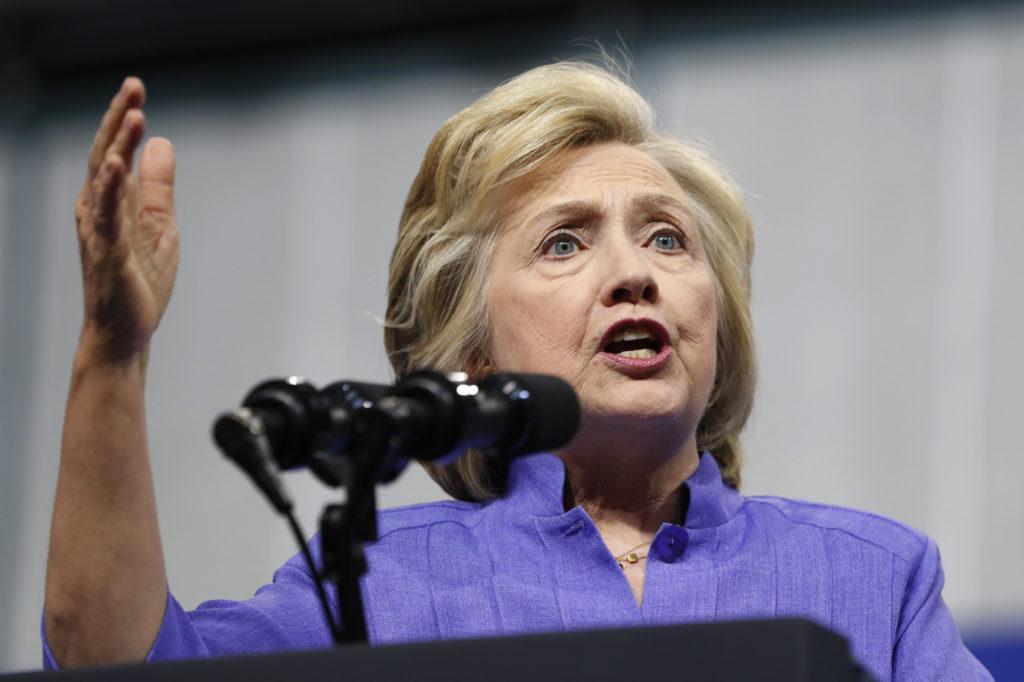
A federal judge on Friday ordered Hillary Clinton to answer questions in writing from a conservative legal advocacy group about her use of a private email server during her tenure as secretary of state. U.S. District Court Judge Emmet G. Sullivan issued the order as part of a long-running public records lawsuit filed by Judicial Watch. The judge’s decision is only a partial victory for the group, which had sought to question the Democratic presidential nominee in person and under oath. The judge said Judicial Watch must submit its questions to Clinton by Oct. 14 and gave Clinton 30 days to respond – a timetable that could push Clinton’s answers past the November presidential election unless Judicial Watch sends its questions earlier than mid-October. Judicial Watch is among several groups, including The Associated Press, that have sued the State Department over access to government records from Clinton’s tenure as the nation’s top diplomat between 2009 and 2013. Republicans are pressing to keep the issue of Clinton’s email use alive after the FBI closed its investigation last month without recommending criminal charges. In a separate development Friday, former Secretary of State Colin Powell said he once sent Clinton a memo touting his use of a personal email account for work-related messages after she took over at the State Department in 2009. In a statement provided to the AP, Powell said he emailed Clinton describing his use of a personal AOL account for unclassified messages while leading the State Department under President George W. Bush. Powell, a Republican, said he told Clinton his use of personal email “vastly improved” communications within the department, which at the time did not have an equivalent internal system. Powell said the FBI may have obtained a copy of his memo to Clinton during its yearlong investigation into Clinton’s use of a private email server to handle sensitive information during her time as secretary. It was not immediately clear whether Powell’s email to Clinton was among the documents from its case file shared earlier this with select congressional committees at the request of House Republicans. Powell, a retired Army general and former chairman of the Joint Chiefs of Staff, said he used a secure computer on his desk at the State Department to manage classified information. Unlike Clinton, Powell relied on a commercially available service to host his personal email account. Clinton’s private server was located in the basement of the New York home she shared with her husband, former President Bill Clinton. Powell issued the statement after veteran political journalist Joe Conason released an excerpt from his upcoming book about Bill Clinton that recounts a 2009 dinner party for Hillary Clinton hosted by former Secretary of State Madeleine Albright. Powell was in attendance, along with other former secretaries including Henry Kissinger and Condoleezza Rice. During dessert, Powell advised Clinton to use a personal email account while in office, as he had done, according to the passage from the book “Man of the World: The Further Endeavors of Bill Clinton” provided to AP. Powell reportedly told Clinton that his use of personal email to communicate with his staff had been “transformative for the department.” According to Conason’s retelling, Clinton replied that she had already decided to continue using the private server in her home she had relied on during her 2008 presidential bid. The Clinton campaign declined to comment on whether the account of the dinner conversation described in Conason’s book is accurate. In his statement, Powell said he has “no recollection” of his purported dinner conversation. Republished with permission of the Associated Press.
In spite of email controversy, Hillary Clinton holds edge over Donald Trump
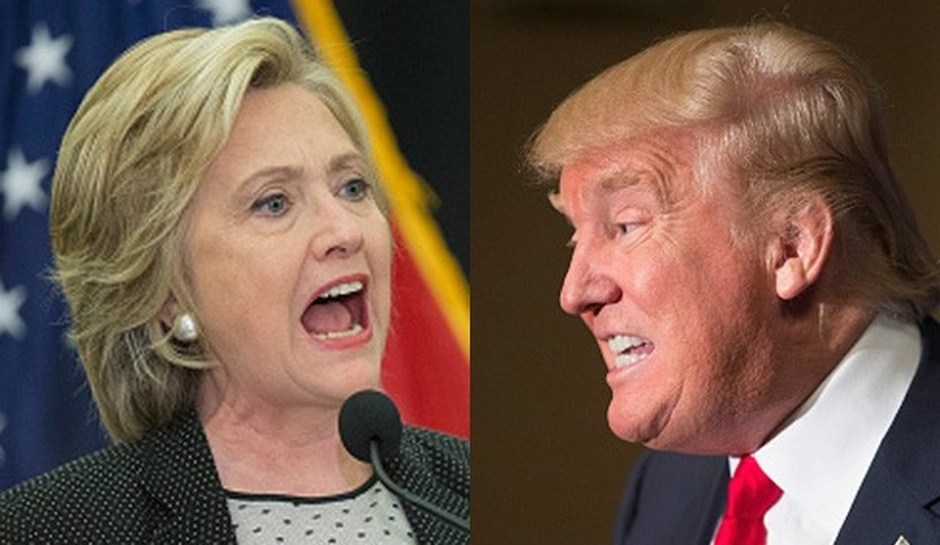
Hillary Clinton can’t seem to escape her use of a private email server as she runs for president. But faced with the choice of Donald Trump, voters seem willing to tolerate the questions it raises about Clinton’s honesty because of their distaste for the Republican nominee. This week, it was the FBI’s delivery to Congress of notes from its investigation into Clinton’s email habits that put one of the most uncomfortable parts of her State Department tenure back in the headlines. It’s an issue unlikely to go away: At hearings planned for next month, Republicans in Congress say they’ll ask FBI officials whether those notes indicate she may have lied to lawmakers in response to questions about her handling of classified material. Yet for all the attention the emails get, recent preference polls show Clinton with a solid and steady lead over Trump in a series of competitive battleground states. Voters also give her higher marks on her readiness for the White House and handling of foreign policy. Those same polls show that much of the public doesn’t like Clinton and find her untrustworthy, and she has acknowledged as much. But it’s worse for Trump, and compared with the billionaire, the perceptions of dishonesty the public has of Clinton appears to be an attribute many Americans are willing to live with. “All of this calculation over the emails will probably be drowned out by the determination that he’s not fit to be president,” said Matt Bennett, once an aide to former Vice President Al Gore and a senior vice president at the centrist think tank Third Way. Should Clinton win the election, questions about her honesty are likely to trail her into the White House and could complicate her ability to push through a policy agenda. It’s a political challenge that mirrors the one her husband, former President Bill Clinton, faced nearly a quarter century ago. As a candidate, Bill Clinton was dogged in 1992 by questions about his honesty, but voters ultimately viewed him as a better caretaker of the economy, which had stumbled during President George H.W. Bush‘s administration. “It will be a challenge,” said Mickey Kantor, a longtime Clinton supporter who chaired his 1992 campaign. “He overcame it and was re-elected. She can overcome it. Not easily, but she can overcome it.” The tone Hillary Clinton sets during a transition and inauguration will likely be key to potentially improving her image, said Chris Lehane, who worked in opposition research in her husband’s administration. “You’ll have a moment there where potentially people will be interested in getting what you rarely get in life, a second look,” he said. According to polls conducted by Gallup, her favorability ratings have fallen from a high of around 65 percent during her tenure as secretary of state to just over 40 percent after the Democratic convention, a historic low for a presidential candidate, surpassed only by Trump. “She will have a significant challenge in persuading the voters of the country that she is indeed honest and trustworthy,” said Republican pollster Whit Ayres, who worked for GOP primary candidate Marco Rubio’s presidential bid. “A great many people will vote for her because they can’t stand voting for Donald Trump. But she’ll still have work to do.” Old Clinton hands see echoes of their strategy in Hillary Clinton’s approach. In early 1992, voters knew Bill Clinton as an Ivy League graduate who avoided serving in Vietnam and had been accused of extramarital affairs, said Paul Begala, a key strategist for the then candidate who now works for the main Democratic super PAC supporting Hillary Clinton’s White House bid. Their goal was to expand public perceptions of Bill Clinton to encompass other, more positive facts, such as his poor upbringing, difficult family life, college scholarships and decision to return to Arkansas as a public servant rather than accept a high-paid corporate job. In 2016, Clinton’s campaign, says Begala, has similarly tried to fill out her public image. It has run ads highlighting her mother’s abusive childhood and Clinton’s early commitment to helping women and children as a legal advocate, while much of the Democratic convention was devoted to Clinton’s personal biography. “Sure, she has had Secret Service protection since she became first lady in 1993 – she needs it. But she was not born in the White House,” Begala said. Clinton and her campaign attribute much of her low approval ratings to a belief that voters like Clinton more when she’s working than campaigning, a view that they say is intertwined with the scandals of her husband’s administration, years of relentless GOP attacks and how Americans view female candidates. But in recent weeks, they’ve preferred to focus on the failings of their opponent. “He’s been unraveling for weeks, since the convention,” Joel Benenson, Clinton’s chief strategy said Thursday in an interview with MSNBC. “He’s a failed candidate and failing campaign.” But even Clinton admits that fixing her trust problem will take time. “I’ve made mistakes. I don’t know anyone who hasn’t. So I understand people have some questions,” Clinton told black voters at a June luncheon in Chicago. “You can’t just talk someone into trusting you. You’ve got to earn it.” Republished with permission of the Associated Press.
Hillary Clinton camp pushes back as GOP challenges FBI, seeks probe
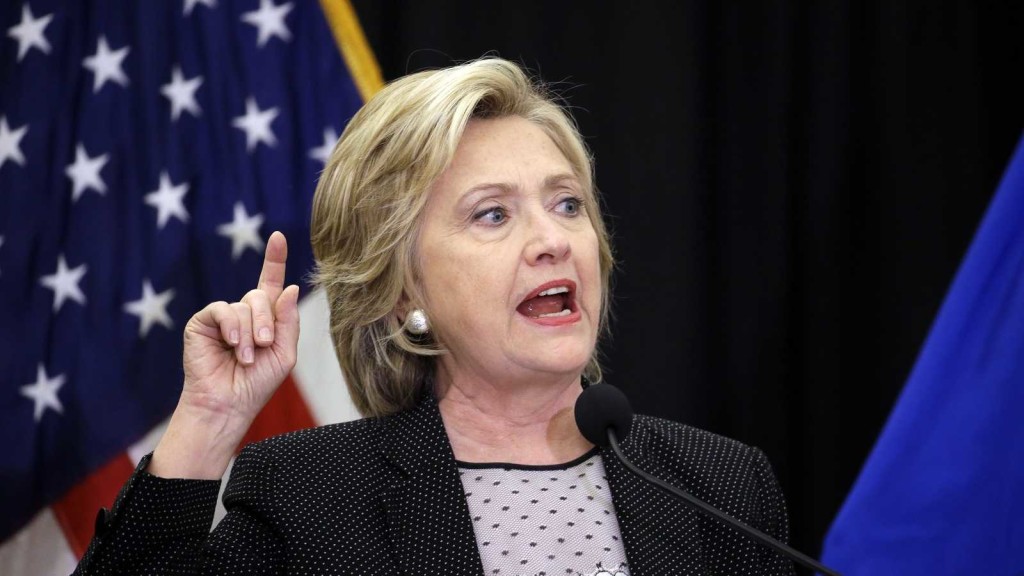
Hillary Clinton‘s campaign is pushing back against congressional Republicans who have challenged the FBI’s decision not to pursue criminal charges against the Democratic presidential nominee and have pressed for yet another investigation. Having failed to find evidence to support their claims that Clinton was negligent in preventing or stopping the deadly 2012 terrorist attack on the U.S. diplomatic facility in Benghazi, Libya, Republicans are now focused on whether Clinton shaded the truth about her haphazard handling of emails containing government secrets. Furious the FBI didn’t press charges against their political rival, House GOP members asked the agency for notes from its agents’ July interview with Clinton. The FBI provided Congress on Tuesday with a raft of documents from its yearlong investigation that it wrapped up last month. Republicans claim the FBI notes, which are typically kept confidential, may show Clinton provided inconsistent answers to questions about her handling of emails containing classified information during testimony last year before the House Benghazi panel. Democrats, meanwhile, expressed concern that the Republicans would leak snippets of the classified materials carefully selected to make the presidential candidate look bad without providing a fair account of what happened. Clinton spokesman Brian Fallon said Tuesday the campaign would like the FBI notes to be publicly released in full. “This is an extraordinarily rare step that was sought solely by Republicans for the purposes of further second-guessing the career professionals at the FBI,” Fallon said. “We believe that if these materials are going to be shared outside the Justice Department, they should be released widely so that the public can see them for themselves, rather than allow Republicans to mischaracterize them through selective, partisan leaks.” A spokeswoman for the Republican-led House Oversight and Government Reform Committee said that the panel’s staff is reviewing documents that are classified as secret. Rep. Adam Schiff of California, the top Democrat on the House Intelligence Committee, said in a statement that the panel received “FBI witness interview reports, including that of Secretary Clinton’s interview, along with other materials from the FBI’s now closed investigative file.” The FBI, in a statement, made clear that it expected lawmakers to use the documents for oversight and not to selectively leak details three months before the election. “The material contains classified and other sensitive information and is being provided with the expectation it will not be disseminated or disclosed without FBI concurrence,” the agency said. The FBI last month closed its yearlong probe into whether Clinton and her aides mishandled sensitive information that flowed through a private email server located in the basement of her New York home. Though he described Clinton’s actions as “extremely careless,” FBI Director James Comey said his agents found no evidence of criminal wrongdoing. Clinton said last year that she turned over all 55,000 pages of work-related emails from her server, but said she deleted thousands more she and her lawyers deemed as personal. Clinton also says she never sent any information by email that was marked as classified. More than 100 emails exchanged by Clinton were subsequently reviewed and determined to contain information considered classified. As evidence Clinton lied, Republicans point to three email chains forwarded to Clinton that contained paragraphs marked “(C),” signifying they contained classified information. Rep. Elijah E. Cummings, the ranking Democrat on the House oversight committee, said Clinton did not originate the three email chains in question, which were forwarded to her private account by aides. He said only one of those emails was later determined by the State Department to contain classified information. “The FBI already determined unanimously that there is insufficient evidence of criminal wrongdoing,” said Cummings, D-Md. “Republicans are now investigating the investigator in a desperate attempt to resuscitate this issue, keep it in the headlines, and distract from Donald Trump’s sagging poll numbers.” State Department spokesman Mark Toner said Tuesday that the FBI allowed the department to review emails the agency is providing Congress. “I think we’re satisfied after having reviewed these emails that the FBI has made arrangements that the documents will be transmitted subject to appropriate handling controls,” he said, adding that the department respects the FBI’s desire to accommodate the requests of its congressional oversight committees. Toner said, however, that the department is still discussing with the FBI the release of additional notes from the interviews investigators did with Clinton and her aides. The announcement comes as the conservative group Judicial Watch announced that it would receive copies of thousands of previously undisclosed work-related emails sent or received by Clinton. The emails, recovered as part of the FBI’s probe, were recently returned to the State Department. Republished with permission of the Associated Press.


